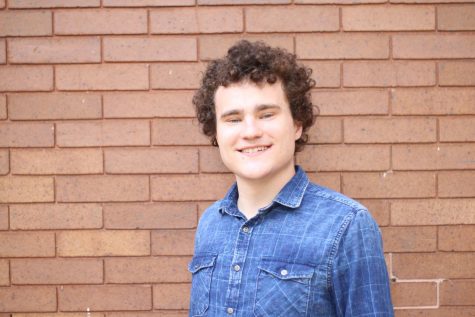Editor’s note: Halloween, drag shows and Wilde, freeing costumes
November 1, 2019
Halloween costumes originated to help people deal with problems from the other side. In my story on the Buckland Museum of Witchcraft and Magick, curator Steven Intermill discussed how the tradition of dressing up as monsters was originally a way for pagans to fend off evil spirits during the Celtic festival of Samhain.
Now, most people going bar hopping are probably not dressing up in fear of vengeful spirits. Instead, Halloween costumes are now a way to have fun with friends. Dressing in costume is a way of expressing the self by dressing up as something entirely different. Though I will not be in town this weekend, I originally planned on dressing as a medieval plague doctor. It fits my macabre sense of humor and going around a party waving around incense, and occasionally yelling “bring out your dead” in a not-so-subtle ode to a Monty Python character sounds like an incredible time.
But no one has described the sheer joy of wearing a costume perfectly suited to your personality quite as well as Oscar Wilde.
“The beauty of a dress depends entirely and absolutely on the loveliness it shields, and on the freedom and motion that it does not impede,” wrote Wilde in his essay “The Philosophy of Dress.”
Wilde’s argument is that dress should be simultaneously shielding and freeing. It is a shield, since it lacks the total vulnerability of being nude, as there is a barrier between ourselves and the outside world. Yet it should not be a constraining shield, limiting motion and livelihood, which is the reason Wilde hated the constrictive frills of the late 1800s fashion.
Costuming and clothing can also be a political act. Events like drag shows are an important part of LGBTQ culture and activism. On Saturday, Nov. 2, Case Western Reserve University is hosting a drag show in support of students at John Carroll University (JCU), whose drag show was canceled by the administration because of fears it will cause “divisiveness,” according to a university spokesperson.
A religious group, like the Jesuits who are in charge of JCU, cannot have the license to forcefully push their views on others. The actions of JCU are a violation of freedom of expression. By putting on a drag show, complete with transit for JCU students, CWRU students are helping students express themselves. This drag show is a great way to give students, both at JCU and CWRU, the opportunity to perform when they were robbed by their own institution.
The divisive ideas supposedly espoused by events like JCU’s canceled drag show have largely remained unsaid. There was, however, a 2018 op-ed column claiming the event was a celebration of “sexual perversity,” with fears that it would lead to the “corruption of Catholic youth,” since drag stars are often men performing as women characters. The idea that art by LGBTQ+ people would corrupt children is a trope that has been used to justify censorship and prejudice for generations.
“There is no such thing as an immoral work,” Wilde wrote in his novel “The Picture of Dorian Gray,” rather, “Books are well written, or badly written.”
Wilde himself fell victim to this reasoning when he was put on trial on charges of sodomy and indecency, legal terms for homosexuality in Britain. During the trial, the prosecution used his work to argue against Wilde, claiming his work was immoral and indecent. He did not argue that he was not homosexual. He lost and was thrown in jail for two years.
“It is that deep, spiritual affection that is as pure as it is perfect,” said Wilde at his trial. “It dictates and pervades great works of art like those of Shakespeare and Michelangelo, and those two letters of mine, such as they are. It is in this century misunderstood, so much misunderstood that it may be described as the ‘Love that dare not speak its name,’ and on account of it I am placed where I am now.”
Wilde was always himself, and his attitudes on dress and his defense of himself at his trial exemplify that. It shows how freedom of expression is about the ability to live as one wants to live, as long as it does not harm others.
In honor of Wilde, I hope you wore a costume this Halloween that shielded and freed you, letting yourself explore different aspects of who you are with the people you love.



